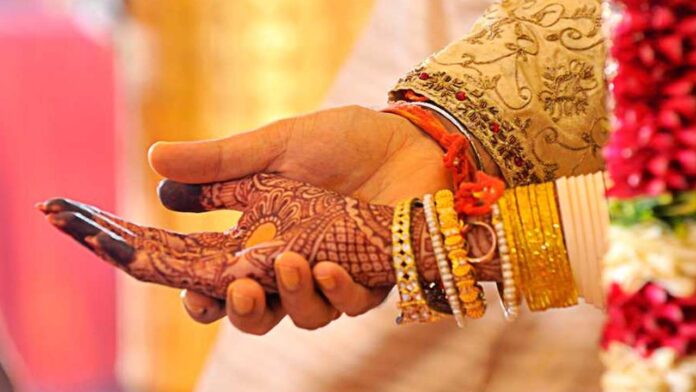Groom walks out of wedding incidents are not uncommon in India, but the recent case from Chandauli district in Uttar Pradesh has taken social media by storm. The groom reportedly abandoned his wedding after chapatis were served late to a family member. This bizarre and shocking event has drawn widespread attention, highlighting deeper issues in marital practices and societal expectations. While weddings in India are often extravagant and heavily ritualistic, they are not without their fair share of drama. This particular incident, however, has left many questioning the priorities of individuals in such sacred unions.
The Incident: Late Chapatis Spark Wedding Walkout
The chain of events began during a seemingly ordinary wedding reception in Chandauli. The groom’s family was served chapatis later than expected, leading to an altercation between the two families. Tempers flared, and the groom, in an unprecedented move, decided to call off the wedding altogether. Reports suggest that the bride’s family pleaded with the groom and his relatives to reconsider, but their efforts were in vain. In a twist that stunned everyone, the groom reportedly went on to marry another woman shortly after walking out of the original wedding.
The bride’s family, understandably distraught, approached the local police to lodge a formal complaint. They claimed financial losses amounting to ₹7 lakh, including ₹1.5 lakh given as dowry to the groom’s family. This turn of events has added a legal dimension to what was initially dismissed as a petty squabble.
Social Media Outrage And Public Reactions
As news of the groom walking out of the wedding spread, social media platforms erupted with reactions ranging from disbelief to humor. Memes and jokes about “chapati gate” quickly went viral, with many ridiculing the groom’s actions. However, amid the laughter, there were also serious conversations about the role of respect, communication, and maturity in relationships.
Critics condemned the groom’s behavior, calling it a blatant disregard for the sanctity of marriage and the feelings of the bride’s family. Some even pointed out the toxic influence of dowry practices and how they exacerbate tensions between families during weddings.
The Dowry Debate: A Root Cause?
While the immediate trigger for the incident was the delay in serving chapatis, many have argued that underlying tensions related to dowry played a significant role. The bride’s family’s demand for compensation highlights how financial transactions often overshadow emotional bonds in Indian marriages. Dowry, though legally prohibited, continues to be a widespread practice, often placing undue pressure on brides’ families.
This case serves as a stark reminder of the urgent need to address the dowry system and its detrimental impact on marital relationships. Activists and organizations advocating for women’s rights have reiterated calls for stricter enforcement of anti-dowry laws and greater awareness campaigns to change societal attitudes.
Cultural Significance Of Food In Indian Weddings
Food holds immense cultural significance in Indian weddings, often symbolizing hospitality, abundance, and celebration. Delays or perceived inadequacies in food service can sometimes lead to misunderstandings or conflicts, as seen in this case. However, the extreme reaction of the groom walking out underscores how cultural sensitivities can sometimes spiral out of control when combined with ego and miscommunication.
Experts suggest that better planning and coordination, as well as open communication between families, could help prevent such issues from escalating. Wedding planners and caterers have also pointed out the importance of setting clear expectations to avoid last-minute disputes.
Legal And Emotional Ramifications
The legal complaint filed by the bride’s family has added another layer of complexity to the incident. If proven, the demand for dowry could result in legal action against the groom and his family under India’s Dowry Prohibition Act. Additionally, the financial losses incurred by the bride’s family could lead to further litigation.
On an emotional level, the incident has undoubtedly caused significant trauma for the bride and her family. Public humiliation and the abrupt end of a long-planned wedding are experiences that leave lasting scars. Mental health professionals emphasize the importance of seeking counseling and emotional support in such situations to navigate the aftermath.
Looking Ahead: Lessons From The Incident
This incident, bizarre as it may seem, offers valuable lessons about the importance of communication, respect, and mutual understanding in relationships. It also highlights the need to reevaluate cultural practices that prioritize superficial aspects over genuine emotional connections. Families and individuals must recognize that weddings are not just social events but also deeply personal unions that require maturity and responsibility.
The broader societal reaction to this incident serves as a wake-up call to address systemic issues like dowry and the undue pressures placed on brides and their families. As conversations around these topics gain momentum, there is hope for a future where such incidents become rare exceptions rather than recurring headlines.
In the meantime, the story of the groom walking out of his wedding over late chapatis will remain a cautionary tale—a reminder of the unpredictable nature of human behavior and the importance of placing relationships above trivial disputes.



